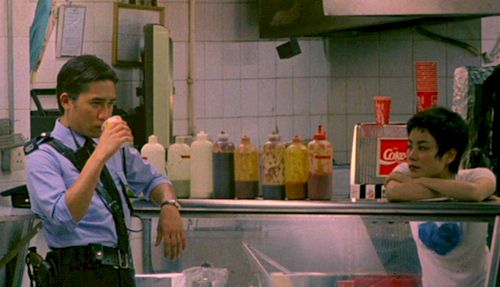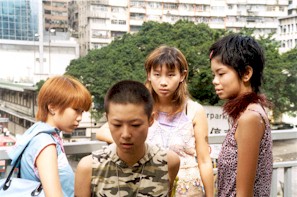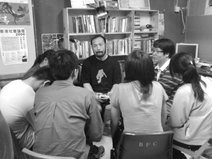After watching both
Chungking Express (重庆森林) and
Spacked out (无人驾驶), I thought it would be interesting to draw a little comparison between these two stunning HK films. Despite their apparent irrelevancy in theme, plot, style, and a lot of things, what is of my concern here is that each film, in one way or another, seems to offer a mapping of the city in which the glamorous mirage-like global space is absent.
In Michelle Huang’s analysis, Wong Kar-wai’s 1994 classic
Chungking Express is seen as the director-
flâneur’s attempt to represent an authentic image of Hong Kong by focusing on the everyday realities of places such as Chungking Mansion and Midnight Express. Inevitably, what is missing in this picture is the dazzling global space, visible only when it is the airport or the trendy bar in Central – place filled with frustration, loss and crushed ‘California Dreaming’. To Huang, this ‘absent dual city’ can point to the detached gaze of the director-
flâneur who shows little interest in critiquing the polarized global city. But more important, it also reveals the complex dialectics between ordinary, lower class city-dwellers and the global space. ‘The invisible is omnipresent’, as Huang puts it, so even though the spectacular lies outside, physically adjacent yet intangible, it nevertheless dominates the daily experience of ordinary Hong Kong people. Their vision, dream, yearning, loneliness, frustration, resistance, and numbness, as the four ‘walkers’ in
Chungking Express poignantly epitomize, all have to do with the rapidly changing global space and the grand narrative that globalization promises everyone a prosperous future, which turns out little more than mere thin air.
[1]In my view, then, by dodging the all-to-familiar image of HK’s skyline, and rendering the omnipresent invisible, Wong Kar-wai has successfully avoided a superficial account of the city, instead, transforming the global city’s profound psychological impacts on its local inhabitants into brilliant cinematic representation. And the film, with that attentive
flâneur’s gaze lingering on a few individuals and places, somehow managed to deliver a specific but universal message that many of us (post)modern city-dwellers can relate to.
Here Lau Kwok-Cheung’s 2000 film
Spacked Out presents an interesting difference. Unlike in Chungking Express, where the characters constantly come back to the same place again and again (a technique of repetition frequently employed by Wong Kar-wai), Lau’s camera follows the female protagonists into the streets of Tuen Mun and Mong Kok, into karaoke bars, shopping malls, their classroom and homes, yet curiously, none of these places appear more than once in the film. Without a nodal point like Midnight Express, Spacked Out is therefore a play of four teenage girls acting against a forever drifting backdrop. The kaleidoscopic cityscape seems no difference than the background images we select when we do sticky-back photos (大头贴): hyper-real, unattached, cut off from any inherent connection with the characters, it implies the
flâneurie of these girls as one of the homeless, the nomadic, and the outcast. Their lack of engaged relationship with the city space speaks of their own identities more than anything else. So if the repetitive return to Midnight Express, OK convenience store, street market, cop 663’s apartment, and California restaurant in
Chungking Express is essential to elucidating the temporal-spatial-psychological effects of the global city, the one-way journey of Cookie, Banana, Sissy and Bean Curd is necessary, too, in order to show how their access to even the most ordinary space of Hong Kong is denied.








